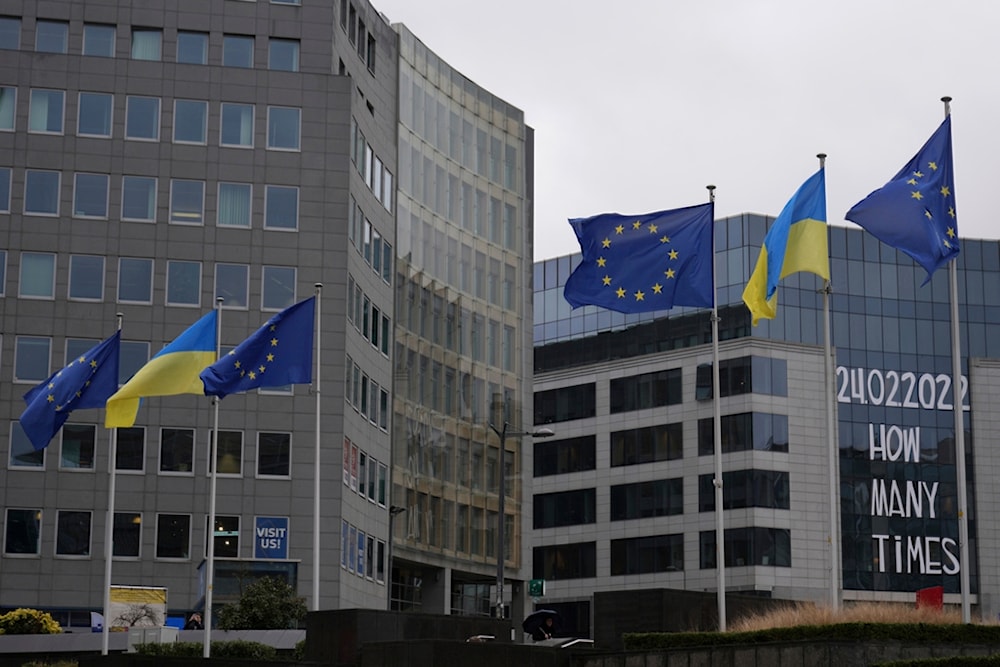Hungary may block renewal of EU sanctions on Russia: Reports
According to a Euractiv report, Hungary's stance on the sanctions renewal appears to be linked to its ongoing concerns over energy security.
-

The European Union and Ukrainian flags flap in the wind in front of a banner outside EU headquarters in Brussels, Monday, Feb. 24, 2025. (AP Photo/Virginia Mayo)
Hungary is signaling possible resistance to the European Union's upcoming renewal of sanctions on Russia, which must be unanimously approved by all 27 member states before they expire on March 15. According to a report by Euractiv, Budapest could use its position to delay or challenge the extension during upcoming discussions.
At last week's emergency EU summit on Ukraine, Hungary was the only member state that declined to endorse a joint statement adopted at the meeting's conclusion. While the issue is set to be revisited at the next EU summit on March 20-21, sources cited by Euractiv suggest that Hungary did not actively obstruct the initiatives proposed by other states.
The report notes that Budapest did not directly challenge the sanctions or the transit of Russian energy resources but may have been reserving its efforts for the next round of talks.
Energy Security at Play
Hungary's stance on the renewal of sanctions appears to be linked to its ongoing concerns over energy security. Foreign Minister Péter Szijjártó has reiterated that Budapest's position will depend on guarantees regarding uninterrupted access to Russian energy supplies.
"Hungary will decide whether to agree to extend sanctions against individuals and entities from Russia and Belarus on March 10, after receiving a response from EU foreign policy chief Kaja Kallas to a letter that outlined violations of energy security guarantees for Budapest," Szijjártó stated.
In January, Hungary secured assurances from the European Commission that oil and gas pipelines carrying Russian hydrocarbons to Europe would be protected. The EU also pledged to seek guarantees from Ukraine that it would not disrupt energy flows to Hungary. Budapest now argues that these commitments have not been fully upheld, which could serve as justification for its resistance to sanction extensions.
Diplomats speculate that Hungary's position may also be influenced by recent remarks from US President Donald Trump, who has suggested that Washington could reconsider its stance on Russia sanctions as part of a broader Ukraine settlement. With uncertainty over future US policy, Hungary may see an opportunity to push back more forcefully against the EU's current approach.
Read more: US to drop out of future NATO military exercises in Europe
Beyond energy security, Hungary's broader position on Ukraine has also placed it at odds with the rest of the bloc. Prime Minister Viktor Orbán has repeatedly called for direct negotiations with Moscow and has opposed additional military aid to Kiev. At the latest EU summit, his refusal to endorse the joint statement on Ukraine reflected Hungary's growing isolation within the EU on this issue.
The renewal of EU sanctions on Russia requires unanimity, meaning that Hungary's opposition could block or at least delay the process. The EU's sanctions framework includes extensive economic measures as well as travel bans and asset freezes targeting over 2,400 individuals and entities linked to Russia's war effort. If Budapest follows through with its objections, the bloc may be forced to make further concessions or risk weakening its sanctions regime.

 3 Min Read
3 Min Read








